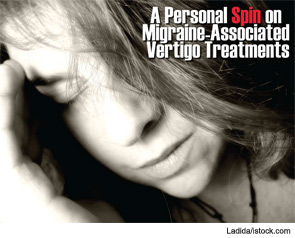
Physicians have noted the potential for dizziness in migraine patients since the 19th century. And yet the 21st century has so far failed to bring any unifying definition to a symptom that is frustratingly diffuse in its intensity and frequency and unclear in its origins.
Explore This Issue
June 2011The market has seen no wonder drugs, and most medications tailored to stopping migraine headaches, like triptans, do not address the primary manifestation of migraine-related dizziness, commonly known as migraine-associated vertigo. Despite the continued absence of rigorous clinical criteria or gold standards of care, however, otolaryngologists are achieving considerable success in treating migraine-associated vertigo, using a more ad hoc strategy that is based on their own experience, anecdotal evidence and therapeutic trial and error.
Eliminating potential triggers, closely monitoring diets and regulating sleep patterns have all proven effective as initial interventions. For more stubborn cases, diagnosis may hinge on how well patients respond to a variety of medications repurposed for migraine-associated symptoms. Using drugs approved for everything from Alzheimer’s disease and epilepsy to high blood pressure and depression, otolaryngologists are finding they can provide relief for a clear majority of their patients.
“Roughly 80 percent of the people that I’ve had in my practice respond to the first drug that I give them, and then the other 20 percent, they struggle,” said Joel Goebel, MD, professor and vice chair of the department of otolaryngology-head and neck surgery at Washington University School of Medicine in St. Louis, Mo.
In the U.S., rough estimates suggest that 18 percent of women and 6 percent of men between the ages of 12 and 80 experience a migraine-type disorder, with rates peaking at about 25 percent among 35-year-old women. Of these patients, one-fourth to one-third may experience episodes of dizziness, chiefly vertigo. Episodes may last seconds or days, and symptoms may appear before or during a headache, ranging from occasional dizziness to severe, progressive brain-damaging disorders.
As otolaryngologists emphasize, however, migraine patients often experience vertigo during headache-free periods. “Some people, for example, will have a pattern where they have headaches, and then for a few years they’ll just have vertigo spells, and then they’ll go back to having headaches again,” said Carol Foster, MD, director of the Balance Laboratory and associate professor of otolaryngology at the University of Colorado, Denver. “So the vertigo is sort of the migraine.”
Because migraine-associated vertigo is widely viewed as a diagnosis of exclusion, otolaryngologists may order MRIs, audiograms and vestibular testing to rule out causes such as a tumor, vestibular or viral neuritis or Ménière’s disease.
Leave a Reply